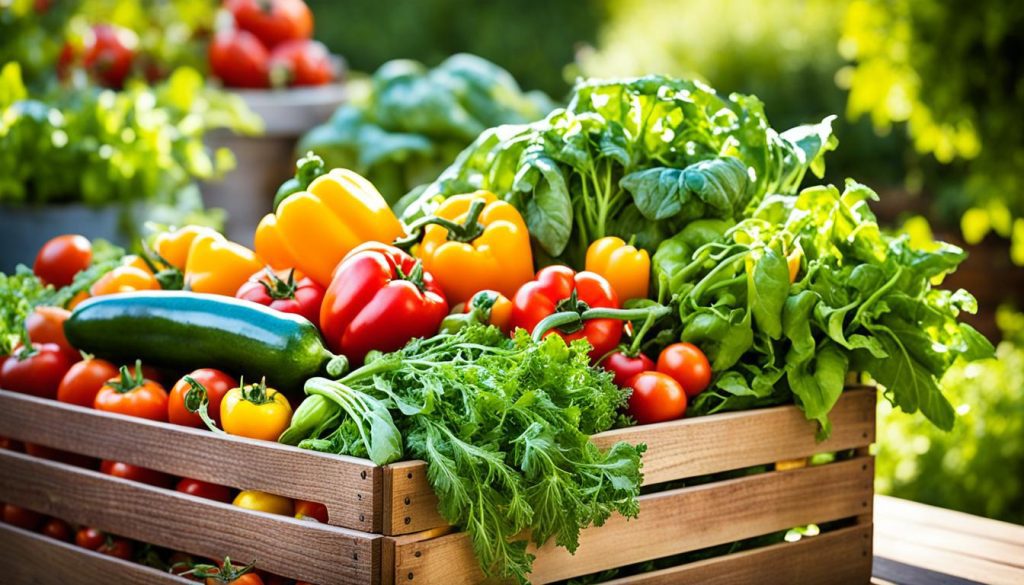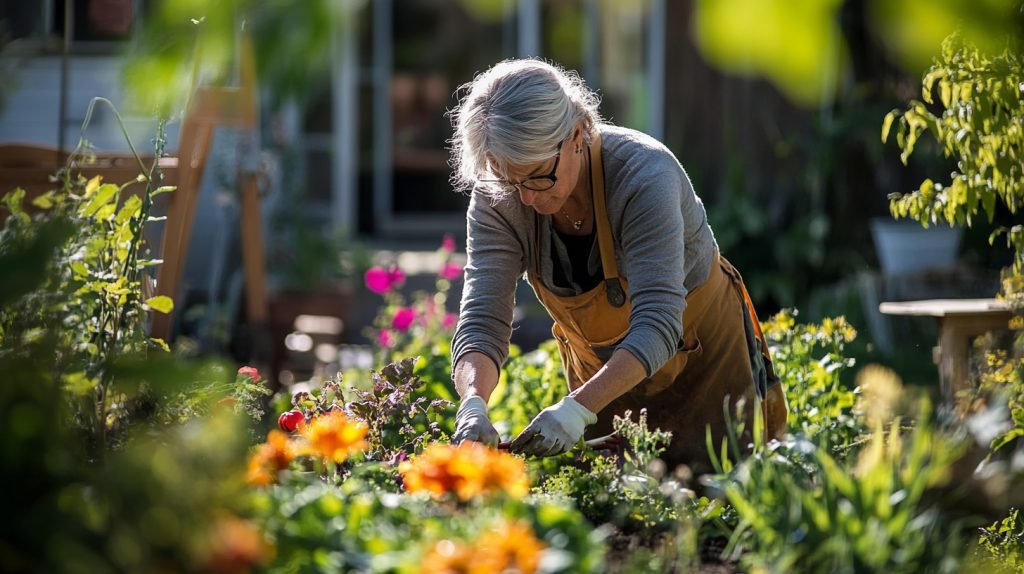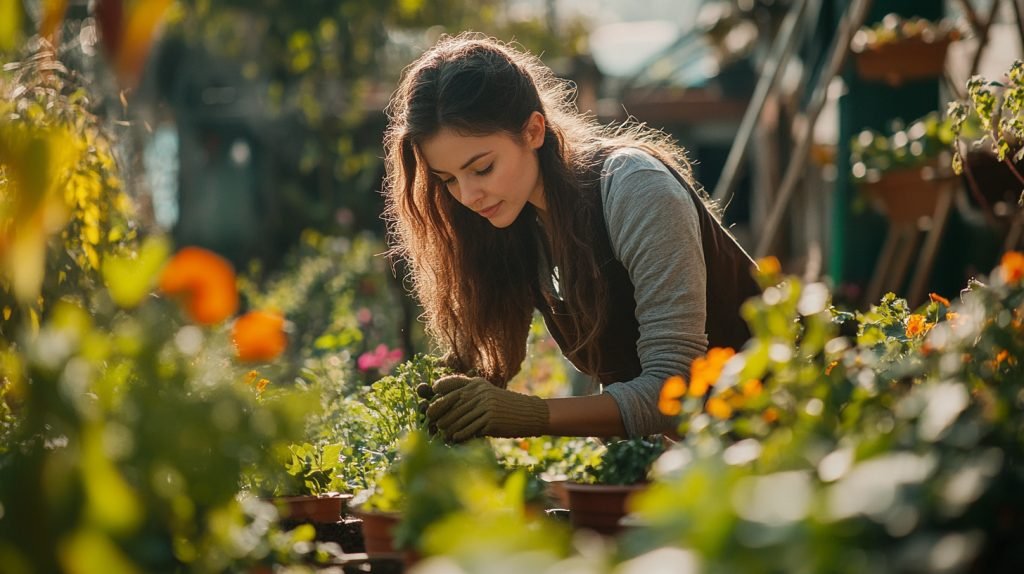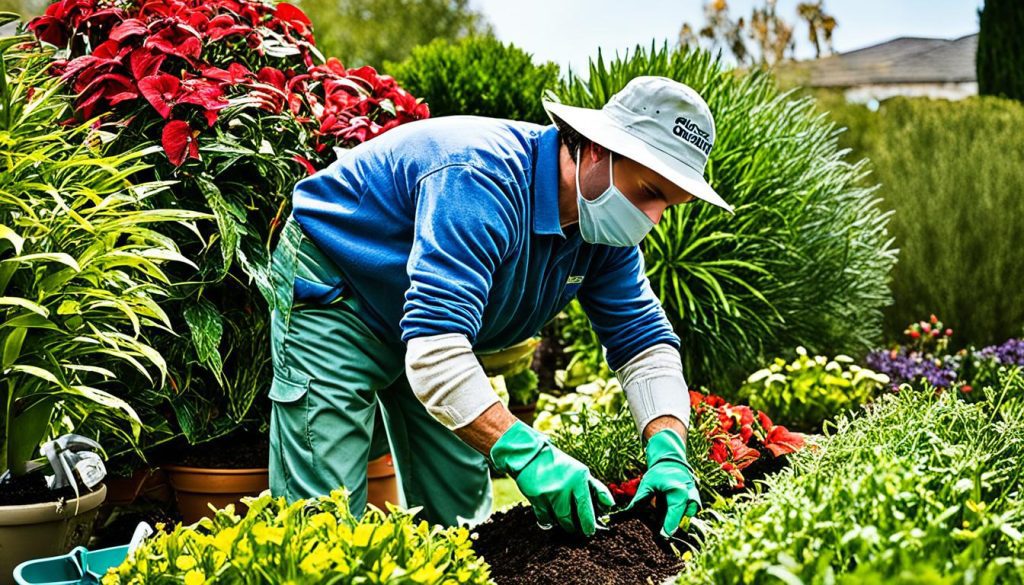Gardening is not just a hobby; it is a powerful pathway to improved health and well-being. Engaging in gardening activities can have a profound impact on your physical, mental, and emotional health. From reducing stress to promoting mindfulness, gardening offers a myriad of benefits that can enhance every aspect of your life. Let’s explore how gardening can improve your health and wellness.
How Gardening Improves Your Health
- Gardening has numerous health benefits for both the body and mind.
- Gardening provides an opportunity for increased physical activity and exercise.
- Growing your own fruits and vegetables can lead to a healthier diet and improved nutrition.
- Gardening helps reduce stress and promotes better mental health.
- Connecting with nature through gardening has positive effects on overall well-being.
Increased Exercise and Physical Fitness
Gardening is not only a pleasurable hobby but also a fantastic way to improve your fitness and stay active. Engaging in various gardening tasks can provide you with a fulfilling form of exercise and contribute to your overall physical well-being.
When you tend to your garden, you partake in activities such as digging, weeding, planting, and carrying supplies. These physical tasks involve movements that engage multiple muscle groups in your body and can effectively burn calories. The repetitive motions of gardening can help strengthen your cardiovascular system, enhancing your heart health and promoting better circulation.
Aside from the cardiovascular benefits, gardening also offers opportunities for strength training. Bending and squatting as you plant and weed exercises your leg muscles, while lifting and carrying tools or bags of soil can help improve upper body strength. Moreover, these movements can enhance your balance and flexibility, further contributing to your overall fitness level.
So, if you are looking for a fun and productive way to stay active, consider incorporating gardening into your routine. Not only will you be able to enjoy the beauty of nature, but you will also reap the physical rewards of gardening as a form of exercise.
Improved Diet and Nutrition
Growing your own fruits and vegetables through gardening can have a significant impact on your diet and nutrition. By cultivating your own home-grown produce, you are more likely to incorporate fresh, nutrient-rich ingredients into your meals, ultimately leading to a healthier and more balanced diet.
When you grow your own food, you have control over the growing process, ensuring that you avoid harmful pesticides or chemicals. This means that the fruits and vegetables you harvest from your garden are not only full of flavor but also packed with essential vitamins, minerals, and antioxidants that support your overall well-being.
Different vegetables have their own unique health benefits. For example, leafy greens like kale and spinach are excellent sources of vitamins A, C, and K, as well as folate and fiber. Tomatoes are rich in lycopene, a powerful antioxidant that has been linked to reducing the risk of certain cancers. Carrots are packed with beta-carotene, which is converted into vitamin A in the body, promoting healthy vision and immune function.

By growing your own food, you have the opportunity to explore a wide variety of vegetables and experiment with different recipes, adding diversity to your diet. This can help ensure that you are getting a wide range of nutrients to support your overall health.
Additionally, gardening for healthy eating can also be a great way to introduce children to a variety of fruits and vegetables. When kids are involved in the growing process, they are more likely to try and enjoy the fruits and vegetables they have helped nurture.
So, whether it’s crispy salads, juicy tomatoes, or vibrant peppers, growing your own fruits and vegetables through gardening provides a delicious and nutritious way to enhance your diet and promote a healthier lifestyle.
Stress Reduction and Mental Health
Gardening offers a multitude of therapeutic benefits that can help improve your mental health and reduce stress. When I engage in gardening activities, it allows me to focus on the present moment, providing a sense of mindfulness and relaxation. The simple act of nurturing plants and tending to a garden can have a profound effect on my emotional well-being.
Spending time in nature while gardening allows me to breathe in the fresh air and connect with the natural world around me. This connection with nature has a calming effect on my mind and body, helping to alleviate symptoms of anxiety and depression. The peaceful and serene environment of a garden can serve as a sanctuary, providing solace and tranquility in times of stress.
Gardening for mental health is a proven practice, backed by research. Studies have shown that engaging in gardening activities can reduce cortisol levels, the hormone associated with stress, and increase the release of endorphins, the feel-good chemicals in our brains. These positive effects can contribute to an overall improvement in mood and well-being.
Benefits of Gardening for Mental Health:
- Reduces stress and anxiety
- Promotes relaxation and mindfulness
- Boosts mood and improves emotional well-being
- Provides a sense of accomplishment and satisfaction
- Enhances self-esteem and confidence
Whether it’s the act of nurturing plants, the therapeutic qualities of being in nature, or the sense of accomplishment that comes from watching your garden thrive, gardening can have a profound impact on your mental health. So why not give it a try and experience the therapeutic benefits of gardening for yourself?
Connection with Nature
Gardening provides an opportunity to connect with nature, which has numerous benefits for your health. Spending time outdoors, surrounded by plants and greenery, can have a positive impact on your physical and mental well-being. Being in nature has been shown to reduce heart rate, lower blood pressure, improve immune response, and increase levels of vitamin D.
When you garden, you immerse yourself in the beauty of the natural world. The vibrant colors of flowers, the rustling of leaves in the breeze, and the melodies of birds create a tranquil and soothing environment. This exposure to nature has a calming effect on your mind and body, reducing stress and promoting relaxation.
Furthermore, being in nature helps to rejuvenate your senses and restore mental focus. The sights, sounds, and smells of the outdoors engage your senses in a way that contributes to a sense of well-being. This sensory experience can enhance your mood, improve concentration, and increase creativity.
Gardening also allows you to observe and appreciate the intricate workings of the natural world. From the growth of a tiny seed to the blooming of a flower, every stage of the gardening process reminds us of the cycle of life and the beauty of nature’s creations. This connection with the natural world can foster a sense of awe, wonder, and gratitude.
Additionally, spending time in nature has been linked to improved physical health. Gardening involves various physical activities such as digging, planting, and carrying supplies, which provide exercise and contribute to better cardiovascular health. Furthermore, exposure to natural sunlight while gardening helps your body produce vitamin D, which is essential for healthy bones and a strong immune system.
Overall, gardening provides a unique opportunity to connect with nature and reap the many benefits it offers. So, take a break from the hustle and bustle of daily life, step outside, and embrace the beauty and healing power of the natural world.
Social Connection and Community
Gardening is not just a solitary activity; it can also be a great way to connect with others and build a sense of community. Whether you join a gardening club or participate in community gardening projects, you’ll have the opportunity to engage with like-minded individuals who share your passion for gardening.
When you garden in a group setting, you can share knowledge, experiences, and tips with fellow gardeners, enhancing your own gardening skills and expanding your plant repertoire. It’s a chance to learn from one another and discover new techniques or plants that you may have never considered before.
But the benefits of gardening in groups extend beyond just gardening knowledge. It’s a chance to form meaningful relationships and bonds with others who have similar interests. Gardening together creates a sense of camaraderie and support, as you work side by side, nurturing and growing plants together.
Benefits of Gardening in Groups:
- Gardening in groups allows you to connect with like-minded individuals who share your passion for gardening.
- By joining a gardening club or participating in community gardening projects, you can learn from experienced gardeners and gain valuable knowledge and insights.
- Gardening in groups fosters a sense of community and unity, creating lasting relationships and friendships.
- Working together in a garden setting promotes social support and interaction, which can lower stress levels and enhance mental well-being.
- Group gardening projects provide a platform for sharing resources, tools, and plants, making gardening more accessible and affordable for all.
So why not grab a friend or join a local gardening group? Experience the joys of gardening together, and reap the benefits of social connection, community, and shared gardening experiences.
Self-Esteem and Personal Growth
Engaging in gardening activities can have a profound impact on your self-esteem and personal growth. When you successfully nurture and grow plants, it brings a sense of accomplishment and boosts your confidence in your own abilities. It’s amazing to see the fruits of your labor and realize that you have the power to create and nurture life.
Gardening is a continuous learning process that allows you to develop new skills and expand your knowledge. As you delve deeper into the world of gardening, you’ll discover different techniques, plant species, and gardening methods. This constant learning journey can stimulate your mind, cultivate your curiosity, and provide a sense of personal growth.
Moreover, gardening allows for a deeper connection with the natural world. Spending time among plants and observing their growth and cycles can instill a sense of awe and wonder. It reminds us of the interconnectedness of all living beings and our role as caretakers of the Earth.
Through gardening, you may also develop a greater appreciation for the environment and the importance of sustainable practices. It can inspire you to become more mindful of your actions and make conscious choices that contribute to a healthier planet.
Overall, gardening nurtures not only plants but also our own sense of self. It builds confidence, fosters personal growth, and connects us to the beauty and wisdom of nature. So, grab your gardening tools and embark on a journey of self-discovery and empowerment.

Building Confidence and Self-Esteem
Gardening provides a sense of accomplishment and boosts confidence in your abilities. Successfully growing plants gives you tangible evidence of your skills and efforts, reinforcing your belief in your capabilities. Cultivating and nurturing life can also be a source of pride, as you witness the fruits of your labor and know that you are capable of creating beauty and abundance.
Personal Growth and Self-Improvement
Gardening is a journey of continuous learning and personal growth. From expanding your knowledge about different plants and gardening techniques to learning patience, resilience, and adaptability, each experience in the garden presents an opportunity for growth. Gardening challenges you to step out of your comfort zone, try new things, and embrace the process of growth, both for yourself and the plants you care for.
Vitamin D and Sun Exposure
I enjoy spending time gardening because it allows me to soak up some much-needed vitamin D through sun exposure. Vitamin D is crucial for maintaining healthy bones and supporting immune function. While it’s important to reap the benefits of the sun, it’s equally essential to protect our skin from harmful UV rays.
When gardening, I make sure to apply sunscreen with a high SPF and wear protective clothing like a wide-brimmed hat and long-sleeved shirt to shield myself from excessive sun exposure. By taking these precautions, I can enjoy the sunshine while minimizing the risk of sunburn and skin damage.
Keeping a balance between sun exposure and sun protection is key to harnessing the benefits of vitamin D without compromising our skin’s health. So, whenever I head out to my garden, I prioritize both my well-being and my gardening tasks.
Hand Strength and Fine Motor Skills
Gardening activities like digging, planting, and pruning can significantly improve hand strength and enhance fine motor skills. By regularly engaging in these repetitive movements, you can keep your hands and fingers robust and dexterous, which is essential for carrying out everyday tasks and maintaining independence as you age.
When you grip gardening tools, dig into the soil, or carefully prune plants, you engage the muscles in your hands and fingers, increasing their strength and flexibility. This enhanced hand strength not only allows you to perform gardening tasks more effectively but also translates into improved abilities for other activities, such as opening jars, gripping objects, or writing.
Fine motor skills involve the coordination and control of small muscles in the hands and fingers, and gardening can be a great way to hone these skills. The precise movements required for planting seeds, pinching off dead leaves, or tying delicate plant stems can help refine your fine motor skills, making your hands more adept at performing intricate tasks.
Additionally, gardening can also provide sensory input for your hands, as you touch various textures, feel the soil between your fingers, and carefully handle plants. This sensory stimulation can contribute to improved sensory processing and spatial awareness, further enhancing your fine motor skills.

Gardening is a rewarding and enjoyable way to enhance both hand strength and fine motor skills. So, whether you’re sowing seeds, tending to your plants, or getting your hands dirty in the garden, know that you’re not only cultivating beautiful flowers and fresh produce but also nurturing your hands and motor skills.
Family Bonding and Education
Gardening is not only a fun and rewarding activity for adults, but it can also be a great way to spend quality time with the whole family. Getting children involved in gardening not only exposes them to the wonders of nature but also provides valuable educational experiences.
Teaching Children about Gardening
Gardening offers a hands-on learning opportunity for children to understand the lifecycle of plants, the importance of nurturing and caring for living things, and the benefits of healthy eating. By involving children in planting seeds, watering plants, and caring for the garden, parents can teach them valuable life skills and cultivate a love for nature.
Gardening for Kids
For kids, gardening can be a thrilling adventure filled with exploration and discovery. From digging in the soil to watching the seeds sprout and grow into vibrant plants, children get to witness firsthand the magic of nature. Gardening also encourages creativity as kids have the opportunity to design and decorate their own garden spaces.
Benefits of Gardening for Children
- Nature Connection: Gardening allows children to connect with nature, fostering a sense of wonder and appreciation for the environment.
- Responsibility: Taking care of plants teaches children about responsibility and the importance of nurturing and caring for living things.
- Healthy Eating Habits: Growing their own fruits, vegetables, and herbs helps children develop a taste for fresh, homegrown produce, encouraging healthy eating habits from an early age.
- Physical Activity: Gardening is a great way for children to stay active, as it involves various physical tasks like digging, planting, and weeding.
- Mental Well-being: Engaging in gardening activities can have a calming effect on children, promoting relaxation and reducing stress.
By engaging in gardening as a family activity, parents can create lasting memories, strengthen family bonds, and instill a love for nature in their children. So gather your gardening tools, put on your sunscreen, and embark on this green-fingered journey together!
Conclusion
Gardening is not just a hobby; it’s a gateway to a healthier and more fulfilling life. Through gardening, you can experience a wide range of health benefits that positively impact both your physical and mental well-being. The combination of increased physical activity, improved diet and nutrition, stress reduction, and social connection makes gardening a powerful tool for enhancing your overall quality of life.
By planting and tending to your own garden, you not only get the opportunity to engage in physical exercise, but you also reap the rewards of eating home-grown fruits and vegetables, which provide essential nutrients for a balanced diet. Gardening allows you to reduce stress and promote mental well-being by immersing yourself in the present moment and connecting with nature. Additionally, gardening can foster social connections, whether through community projects or shared gardening experiences with family and friends.
No matter the size or type of garden you have, whether it’s a small herb garden on your windowsill or a sprawling vegetable plot in your backyard, gardening offers endless possibilities for improving your health and wellness. So pick up your gardening tools, step outside, and embark on a journey of growth, nourishment, and self-care. Discover the joy of harnessing the power of nature to cultivate a healthier, happier you.



